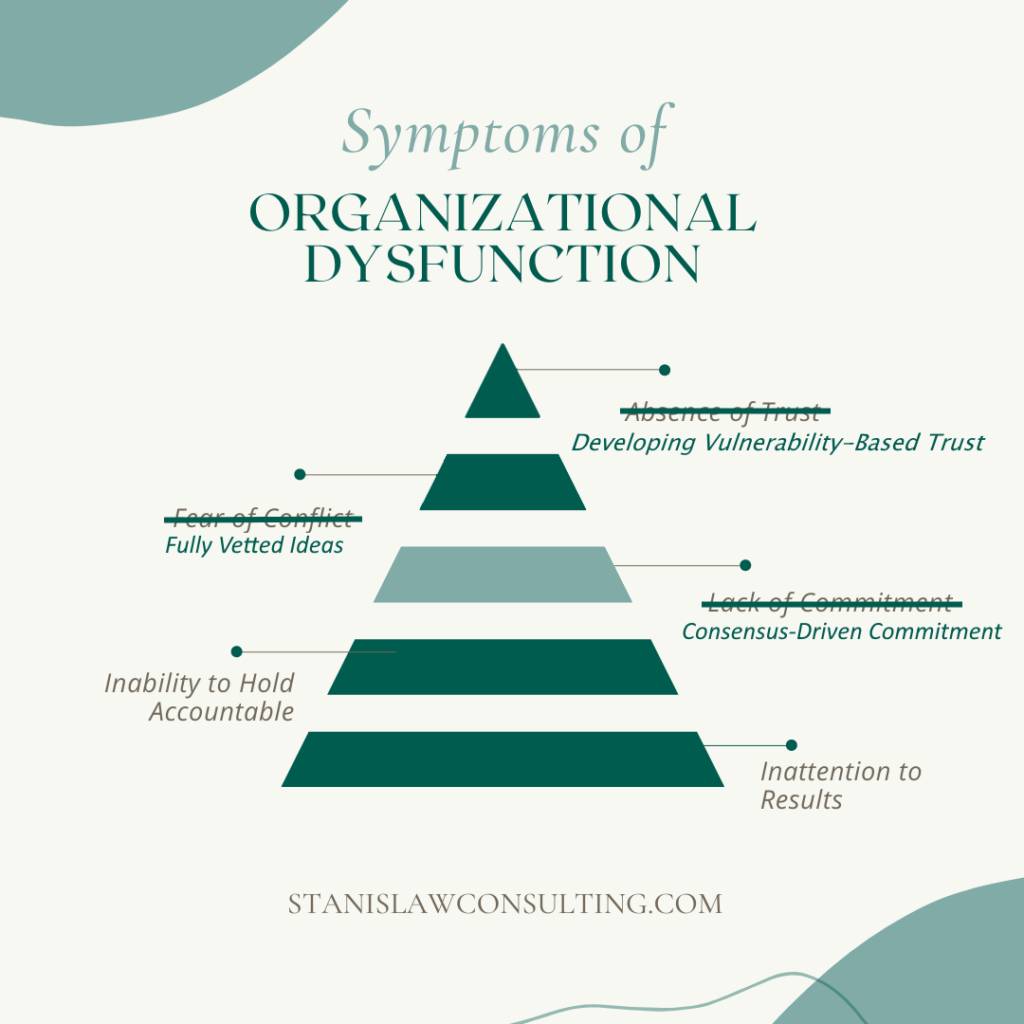Does it feel like your team avoids commitment? As a manager, are you constantly the disciplinarian when goals aren’t being met? This is a sign of organizational dysfunction. Once your team has developed trust of one another and come to view conflict as a strength-building tool, you can turn your focus toward getting clarity on commitment. With your whole team pulling together, you will find much smoother sailing toward your organizational goals.
This is the fourth of a six-part blog series based on the book The Five Dysfunctions of a Team by Patrick Lencioni. Here are links to the previous posts:
- Part 1: 5 Symptoms of Organizational Disfunction,
- Part 2: Developing Team Trust
- Part 3: Overcoming Fear of Conflict
Future blog posts will dive deeper into the last 2 symptoms of organizational dysfunction and provide you with tools for treating the symptoms and moving your team toward added productivity.
Get Help with Leadership, Conflict Resolution, and Business Strategy
Talk to a consultant who can help you make strategic decisions about the future of your business.
Is a Lack of Commitment Making Your Team Miss Their Goals?
Teams who haven’t addressed conflict around their plans will not be fully committed to the decisions they make. When people aren’t involved in the decisions that make up a plan, they won’t be committed to seeing that plan through. This doesn’t mean that every employee needs to be in every planning meeting. However, you do need to make sure there are ways for team members with concerns to make their opinions heard.
Consensus Breeds Commitment
Teams work together best when everyone is leaning into their oars and pulling together. To get there, you need everyone to feel invested in where the organization is going, and your plan to get there. Focus on developing consensus on a level appropriate to the task. Sales teams and retail workers can brainstorm how they will divide up their tasks and discuss solutions to the on-the-ground problems they face. Further up the line, your teams can work together to set quantitative and qualitative benchmarks and plan strategies for how the company will reach its goals.

The important part is to make sure team members feel heard and valued. When they see that their feedback can affect the decisions being made, they will be more invested in making sure those decisions bear results. They will want to work for the success of a strategy or tactic that they had a hand in choosing.
Getting Clarity on Commitment Brings Teams Together Around Challenges
This also increases the chances that your team will pull together when things get challenging. For example, imagine two development teams trying to make a new software upgrade. In one, the management sets out all the features to be included and a firm deadline for launch. In the second, the team has brainstormed fixes and upgrades to include along with the managers and been involved in the estimates for how long the development will take. Now imagine both teams hit a snag when they learn the platform doesn’t support one of the planned improvements.
The top-down team will be far more likely to throw up their hands and tell their bosses that it can’t be done. They may complain that their managers don’t understand how the system operates and ask them to do the impossible. If the managers refuse to adjust the deadline or the features, some could even start looking for a new position.
But the collaborative will be far more committed to making “their” ideas work. Their anger is more likely to be focused on the inflexible platform than on their managers. Because they have pride in their work, they will be driven to find a solution. If one does not present itself, they will also know they can come to their managers to explain the problem and reasonably expect the goal to be adjusted to meet the reality they are facing.
Get Help Building Trust to Overcome Organizational Dysfunction
Bringing everyone together to build commitment takes meaningful collaboration and a willingness to listen to coworkers’ concerns. You will need the help of a resourceful and emotionally intelligent facilitator to help you develop new patterns of communication and collaboration. Once you and your coworkers are committed to your goals, you can take the next step to overcoming organizational dysfunction: developing accountability.
David Stanislaw is an organizational development specialist with over 25 years’ experience in resolving organizational dysfunction. Through business consulting and facilitation, David helps businesses and teams improve productivity and team cohesion. Contact us to meet with David to move toward high organizational functioning today.


Recent Comments